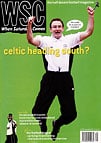 Colin Mansley explains how the club stewards and Chester City fans are united in their opposition to American owner Terry Smith
Colin Mansley explains how the club stewards and Chester City fans are united in their opposition to American owner Terry Smith
As Rushden & Diamonds, their place in the League assured, embarked on a lap of honour round the Deva Stadium on May 5, an alternative attraction was staged in front of the main stand. The matchday stewards removed their fluorescent jackets, piled them into a heap on the pitch and, to rapturous applause, unfurled “Smith Out” banners. This was just the culmination of months of protest against Terry Smith, the American who acquired the club from administration two years ago.
Prior to the Rushden match, City fans had paraded a coffin through the streets. As far as we are concerned, the club that we knew and loved has died at Smith’s hands. Desperate to be acclaimed as a sporting hero, Smith has only been successful in driving away hardcore supporters. Many have vowed never to return to the Deva while he remains in charge.
Since June 27 several fans, including some of the erstwhile stewards, have formed a peaceful picket at the entrance to the Deva. Smith appointed Gareth Evans, a golf course owner and former agent to the Stone Roses, as hatchet man to deliver sackings to the long-suffering Graham Barrow among others. Barrow’s position as manager had been undermined all season by Smith’s interference in team affairs, yet Smith hired someone else to sack him and claimed it was not his decision.
Gordon Hill, the former Millwall and Man Utd winger, whom Smith had met while coach-ing in America, was appointed youth team coach last season. Smith denied at the time that Hill would become first team manager, yet it came as no surprise to the fans that, on Barrow’s demise, Hill – by now director of football at the Deva, despite the youth team’s worst ever season – was given the post.
Meanwhile Smith, who was reduced to com-municating with the outside world via his fax machine, had done nothing about replacing the match stewards. A lucrative friendly with Everton loomed on July 25. Police insisted that the match be made all ticket and county council trading standards officers asked for evidence that the club was able to provide enough stewards. When this evidence was not forthcoming, the safety certificate was revoked. Everton, who had also been contacted by Chester fans urging them not to come, pulled out of the game citing the understandable worries about crowd safety as the reason. A furious Smith faxed Everton to say that if the club went broke it would be their fault.
In desperation, Smith hired a security firm to steward future matches. Without the safety certificate, even the opening match of this season against Woking would have had to have been played behind closed doors. This could have easily led to Chester’s expulsion from the Conference. The new arrangement will reportedly cost £1,200 a game, three times the normal amount, and the ground will still only be open to half its 6,000 capacity. The police have also insisted on a costly presence – no doubt because Gordon Hill got such a hostile reception from City fans at a recent friendly with Connah’s Quay Nomads that seven police cars had to be called to escort him from the ground.
With the majority of City fans likely to be absent, either actively boycotting home matches or just plain fed up, the cost per head of crowd safety at Chester will probably be the highest anywhere in England. The supporters trust and other prospective buyers are well prepared and waiting in the wings for the time when Smith’s ego-trip is over. In the meantime, the fans have even talked about forming another club and starting all over again. However long it takes, the City of Chester wants its football club back.
From WSC 175 September 2001. What was happening this month